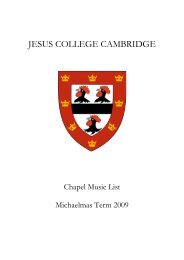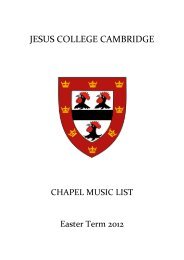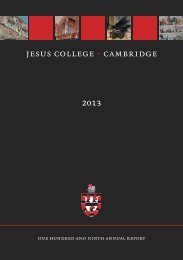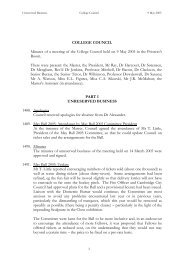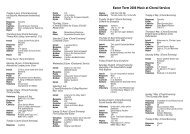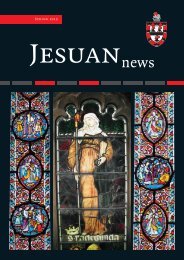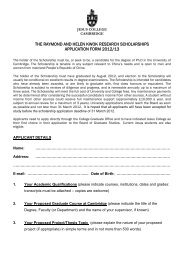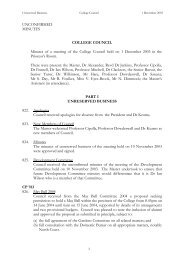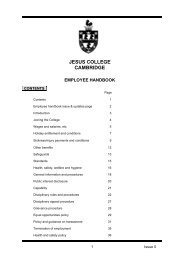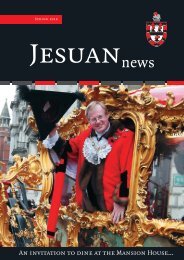2012 Annual Report - Jesus College - University of Cambridge
2012 Annual Report - Jesus College - University of Cambridge
2012 Annual Report - Jesus College - University of Cambridge
Create successful ePaper yourself
Turn your PDF publications into a flip-book with our unique Google optimized e-Paper software.
52 CREATOR OF THE MODERN COLLEGE I <strong>Jesus</strong> <strong>College</strong> <strong>Annual</strong> <strong>Report</strong> <strong>2012</strong><br />
both the Commission’s requests for<br />
information and its invitations to submit<br />
proposals for making <strong>Cambridge</strong> more<br />
attractive and accessible to more students,<br />
and for widening its curriculum and putting<br />
its endowments to better use. (His successor<br />
as Vice-Chancellor was more co-operative,<br />
but only one Jesuan broke ranks: Thomas<br />
Gaskin, a former Tutor who, safe in a local<br />
parish, was still teaching Mathematics in<br />
<strong>Cambridge</strong>). The Commissioners’<br />
recommendation for allowing some<br />
fellowships to be held by married men –<br />
generally considered an essential<br />
precondition for improving the quality <strong>of</strong><br />
university teaching by allowing it to become a<br />
life-time career – was spurned by the Master<br />
and Fellows <strong>of</strong> <strong>Jesus</strong>, which was one <strong>of</strong> only<br />
three colleges to remain completely under<br />
this handicap. 7 Nothing, if Corrie could<br />
prevent it, was going to change. While<br />
Norrisian Pr<strong>of</strong>essor <strong>of</strong> Divinity (1838-54) he<br />
had declined – claiming to be over-worked –<br />
to participate in the “voluntary” theological<br />
teaching and examining <strong>of</strong> intending<br />
ordinands on which nearly all diocesan<br />
bishops, hoping for a more theologically<br />
literate clergy, were keen. It was an odd<br />
stance for the Head <strong>of</strong> a college, the bulk <strong>of</strong><br />
whose students were destined for the<br />
Church, and not one calculated to attract the<br />
more serious minded (or their parents) to it,<br />
or <strong>of</strong>fset by the announcement that each Lent<br />
term the Master gave a course <strong>of</strong> divinity<br />
lectures.<br />
Corrie was, when he appointed Morgan<br />
Tutor, seventy and tired – probably more tired<br />
than when, thirteen years earlier, he had<br />
come to the <strong>College</strong> from St Catharine’s (even<br />
smaller and poorer than <strong>Jesus</strong>) where he had<br />
been a Fellow since graduating (as 18th<br />
Wrangler), Dean for 31 years, and Tutor for<br />
28 (eleven <strong>of</strong> them during his sixteen-year<br />
term as Norrisian Pr<strong>of</strong>essor). By 1863 he had<br />
settled into the routine <strong>of</strong> spending the six<br />
summer months at his parish <strong>of</strong> Newton-inthe-Isle,<br />
on the northern edge <strong>of</strong> the<br />
<strong>Cambridge</strong>shire fens, a living given to him by<br />
his former Tutor at St Catharine’s, and<br />
predecessor as Norrisian Pr<strong>of</strong>essor, Bishop<br />
Turton. Having appointed his former pupil to<br />
the Mastership he sought to compensate for<br />
its inadequate stipend by presenting him to<br />
“the best living in my gift”. The <strong>College</strong> was,<br />
while the Master was away, left in the care <strong>of</strong><br />
its President, Arthur Westmorland, who also<br />
acted, in effect, as Bursar. Like Morgan he<br />
had come to <strong>Cambridge</strong> via King’s <strong>College</strong><br />
London. 8 A layman, a barrister and a man <strong>of</strong><br />
some means, he was prominent in the town’s<br />
political life – in the Conservative interest, <strong>of</strong><br />
course – but little involved in academic affairs<br />
or with students. They were Morgan’s<br />
responsibility and though Corrie was, like<br />
many said to suffer from poor health, to live<br />
to a ripe old age (92), he neither opposed nor<br />
interfered with Morgan’s ideas for the<br />
<strong>College</strong>, little though they can have appealed<br />
to him.<br />
M organ, now 33, was, by contrast, the<br />
very embodiment <strong>of</strong> the vigorous<br />
masculine Victorian clergyman. He had<br />
rowed in more than a hundred intercollegiate<br />
races, stopping only when rules<br />
about standing were introduced, but then,<br />
with other energetic dons, founding their<br />
own boat club whose name, “The Ancient<br />
Mariners”, revealed its close association<br />
with Coleridge’s old college. 9 In the<br />
previous year he and Leslie Stephen had<br />
been the first climbers to traverse Jungfrau<br />
Joch, and he had toured Sweden, Finland<br />
and Russia, publishing a book about his<br />
trip. 10 He was, too, a keen cyclist. Crucially<br />
for him and the <strong>College</strong>, he was able,<br />
within two years, to secure the election as<br />
Fellow and Dean (thereby freeing himself<br />
from that <strong>of</strong>fice) <strong>of</strong> another Morgan –<br />
Edmund Henry – but no relation, 24th<br />
Wrangler, and every bit as energetic and<br />
enthusiastic a sportsman, though<br />
preferring land to water, a rougher and less<br />
sophisticated man: to be known as ‘Red’<br />
Morgan, so as to distinguish Dean from<br />
Tutor.<br />
A muscular Christian if ever there was one,<br />
‘Red’ Morgan was a practical, business-like<br />
man, with a sound financial sense – it was he,<br />
not Westmorland, who worked out how the<br />
new buildings that ‘Black’ Morgan wanted<br />
could be paid for, and it was he who oversaw<br />
the builders and saw that the <strong>College</strong> got



